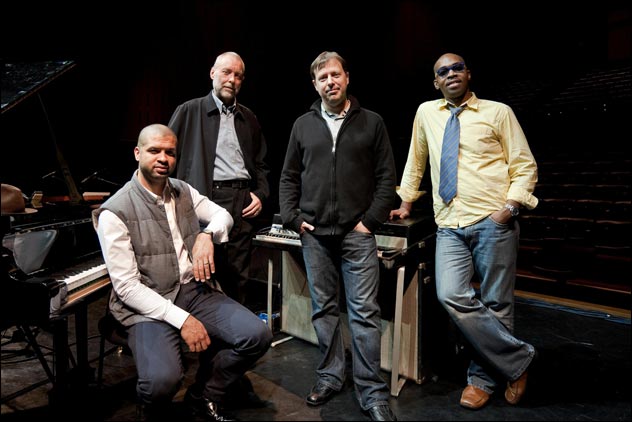
The lights have dimmed, the group on stage has started playing, and the place is quiet. Dave Holland begins playing a soft note on his upright bass, repeating it, while drummer Eric Harland rattles out delicate, precise, quiet snare rolls. Over on the piano, Jason Moran listens intently, forming long, resonant chords. By the time Chris Potter starts blowing, the tone has been set.
This is Dave Holland’s Overtone Quartet, a pleasant surprise to those expecting anything close to the jazz giant’s past glories. Though Holland played bass on Bitches Brew, and led the avant-garde hallmark Conference of the Birds, his Overtone Quartet is a different creature entirely—it balances on intuition and interplay, bordering on ESP.
A better cast for this particular approach would be hard to imagine. In front of a sold-out SFJAZZ audience at the Palace of Fine Arts on Friday night, Dave Holland’s Overtone Quartet exhibited a collective mastery of the art of listening to one another in jazz. In fact, the set’s first two selections, “The Outsiders” and “Walkin’ the Walk,” nearly focused more on input than output.
Then, during Harland’s tune “Treachery,” a thundering Jason Moran solo opened the floodgates. With his arms bouncing off the keys, Moran’s vivacious invention took center stage, and Potter came back in clearly energized.
From that point forward, the band clearly came together. Moran opened “Blue Blocks,” the opening track from his most recent album Ten, with a pensive melody; the full band hopped in and fluidly turned it into an earthy, swinging spiritual. “Trail of Tears,” a Holland composition, opened with a lovely bass solo, then reimagined the spirit of Henry Mancini’s “Charade” as a noir-esque spectre. Chris Potter, who ranges from lilting soprano saxophone to sheets-of-sound tenor, was a weak link on Friday night, but shined here, blowing breathy, low-register Ben Webster notes.
But it was Holland’s “Patterns” that brought the night’s highpoint. As Moran and Potter settled into a cyclical, repeating figure, with Moran on a Fender Rhodes, Harland worked his magic. First, he jumped schizophrenically from one quiet hip-hop pattern to the next, playing out of rhythm, like a needle being dropped at various places on a record. But he slowly increased the volume and pace, aiming at the sides of his drums, his hi-hat stand and his mounted tambourine. He built to such a point that his cowbell fell off its stand and onto the floor, and by the end of the passage, Harland was exploding all over the kit, the pieces of the previous eight minutes’ soloing pouring forth ferociously.
Because of moments like this, it’s no wonder the sold-out crowd moaned their disappointment when Holland announced the last song, “Ask Me Why.” Naturally, the group was cajoled out again for an encore, and the standing ovation that followed brought the close to a memorable night of jazz played by the best.
–
(Note: Jason Moran and Eric Harland return to SFJAZZ with Charles Lloyd at the Herbst Theatre on April 22; it’s a stellar band that I’ve raved about before.)
Live Review: Dave Holland’s Overtone Quartet at SFJAZZ









